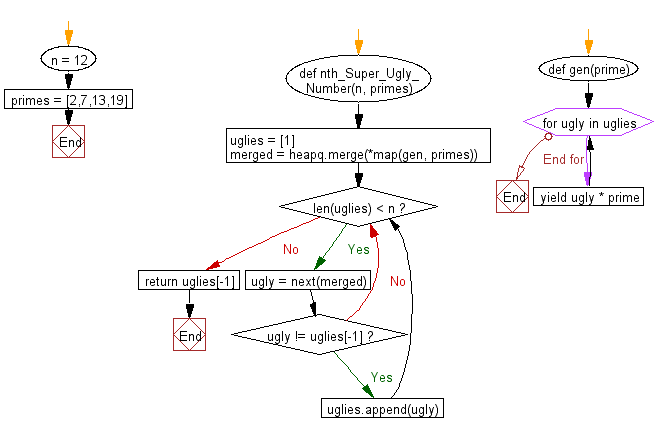Python: Find the nth super ugly number from a given prime list of size k using Heap queue algorithm
13. Nth Super Ugly Number
Write a Python program to find the nth super ugly number from a given prime list of size k using the heap queue algorithm.
Super ugly numbers are positive numbers whose all prime factors are in the given prime list primes of size k. For example, [1, 2, 4, 7, 8, 13, 14, 16, 19, 26, 28, 32] is the sequence of the first 12 super ugly numbers given primes = [2, 7, 13, 19] of size 4.
Sample Solution:
Python Code:
import heapq
#Ref.: https://bit.ly/32c9P3A
def nth_Super_Ugly_Number(n, primes):
uglies = [1]
def gen(prime):
for ugly in uglies:
yield ugly * prime
merged = heapq.merge(*map(gen, primes))
while len(uglies) < n:
ugly = next(merged)
if ugly != uglies[-1]:
uglies.append(ugly)
return uglies[-1]
n = 12
primes = [2,7,13,19]
print(nth_Super_Ugly_Number(n, primes))
Sample Output:
32
Flowchart:

For more Practice: Solve these Related Problems:
- Write a Python program to compute the nth super ugly number using a min-heap to generate numbers from a given list of primes.
- Write a Python script to generate super ugly numbers by multiplying primes and then using heapq to find the nth element.
- Write a Python function to implement a heap-based approach for finding the nth super ugly number and then test it with various prime lists.
- Write a Python program to calculate super ugly numbers using heapq and validate the nth result against expected values.
Go to:
Previous: Given a n x n matrix where each of the rows and columns are sorted in ascending order, write a Python program to find the kth smallest element in the matrix.
Next: Write a Python program to get the k most frequent elements from a given non-empty list of words using Heap queue algorithm.
Python Code Editor:
Have another way to solve this solution? Contribute your code (and comments) through Disqus.
What is the difficulty level of this exercise?
Test your Programming skills with w3resource's quiz.
